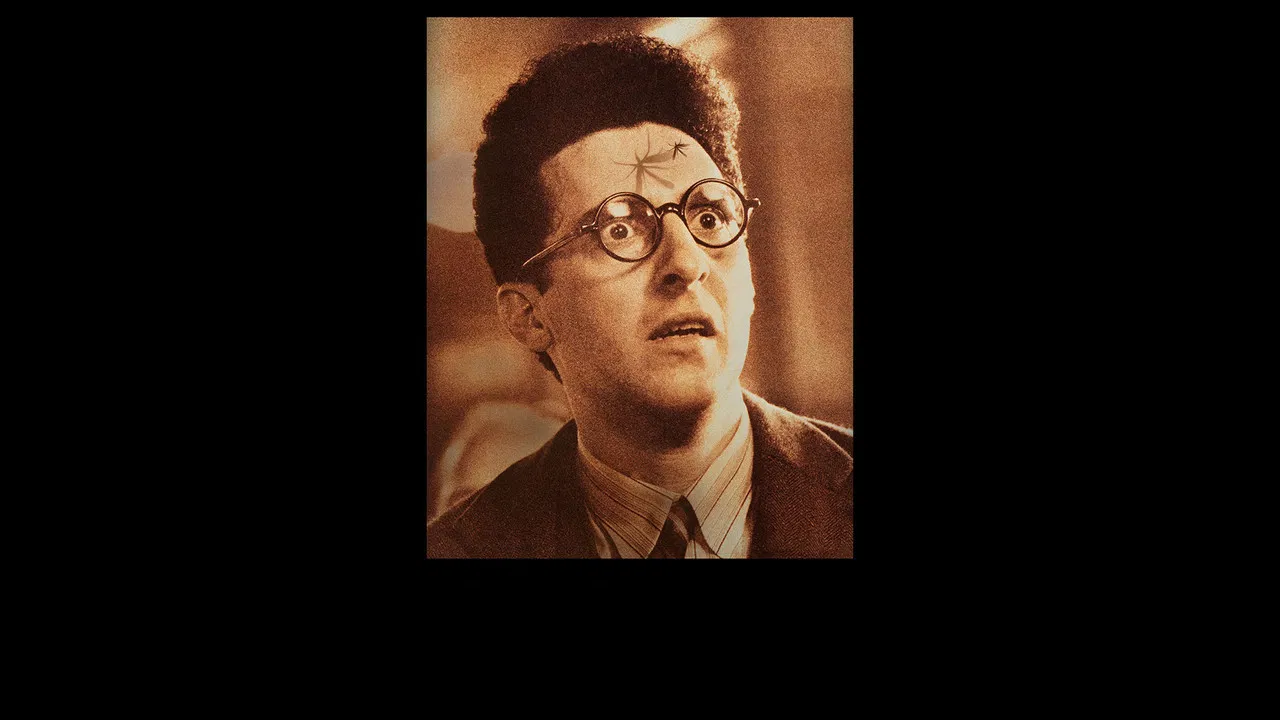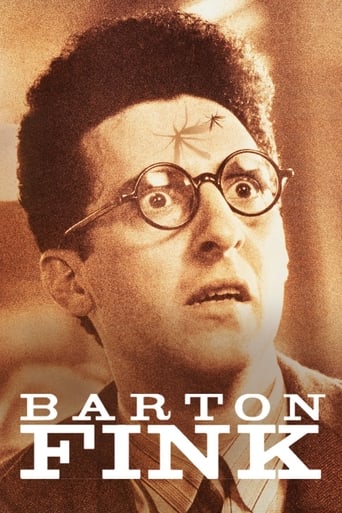

The brother Cohen should be a subject of study,their minds are brightening,each movie is engineered at smallest details,Barton Fink was the third one for this great couple,could be slow down at first but ain't necessarily uninteresting at all, far from it,moving foward all things are putting together and gaving us an idea of fully understanding,it's not for all tastes of course,but for those whom like to watch something weird and fresh,deep and claustrophobic,a fullest surrealism and enigmatic in the end leting a hole inside us,worth to see it again with already forgotten and fine actor John Turturro after a long time!!!Resume: First watch: 1997 / How many: 3 / Source: TV-DVD / Rating: 8.5
... View MoreSome individual scenes in 'Barton Fink (1991)' are great, emphasising the Coen's philosophy that the scene takes precedent over the story, and there's a chunk just after the halfway point where things really pick up steam and a proper 'plot' seems to be getting underway - until the film just ends without any real satisfying resolution, that is. For most of the run-time, though, this off-kilter 'comedy'-drama lacks drive and instead meanders around through ponderously aloof satirical sequences in which the protagonist pretentiously proposes that his writing must come from a source of pain and how that's more important than critical acclaim or audience acceptance. It's frustrating that there seems to be some hints of a sub-layer to the narrative, indications that perhaps something supernatural is going on beneath the surface or that we're going to get a big 'reveal' in the third act that makes sense of some of the stranger moments (or at least cements the necessity of their inclusion), but though there is a 'twist' of sorts that slips a slice of sinister into the otherwise lukewarm narrative, these hints and this plot point peel away to surmount to nothing and, as such, seem like hollow inclusions only added to infuse a false sense of depth to a hopelessly shallow narrative. This seemingly indicates that the Coens themselves fell victim to the writer's block that consistently aisles their bespectacled creation. 6/10
... View MoreThis is probably one of the most hermetic, personal and autobiographical films that the Coen Brothers have ever presented. Many people find it boring. I understand and I can even agree but I also believe that I understand, at least in part, what the directors wanted to tell us.There is a lot of common between the Coen's and Barton Fink, an idealistic intellectual Jew who idolizes ordinary people and, therefore, cannot see how stupid they are (the Coen's can). Suddenly, Fink is hired to write the script for a mediocre B movie about pugilism. The kind of movie ordinary people pay to see even today. Of course the script, by an intellectual full of ideals, would never be useful in these kind of film because Fink didn't know how to adapt himself to the task. He is far above ordinary men to realize what they want to see and that is why he would never please them. This is not just with Fink: today, the majority of people don't like theatre or art because it has become too elitist and intellectual to appeal the masses (taking theatre and the arts as an example, we can still think of classical music or even cinema).From this point of view, this film is deeply intelligent: it starts out as a very intellectual and hermetic film which will make the most idiotic audience flee from the theater and, then, it gradually becomes more "normal" through action and violence. Even so, it always contains some intellectuality, through elements and moments that the film never bother to explain (the importance and content of the box that Fink receives near the end, for example, a thing that left me confused and curious). Its as if the film, even making an effort to adapt itself, never ceased to be what it really is. In the midst of it all, I enjoyed the work of Turturro, which gave life to the protagonist. He knew how to make his character naive and dreamy. Fink sometimes seems so oblivious to the world around him that he seems to be stoned. What counts for him is the world he has inside his head. Very interesting, but difficult to swallow for commercial audiences.
... View MoreI'm going to try to break this movie's symbolism down. This is just my opinion, you're open to your own of course.Personal Interpretations:Barton Fink: Barton Fink represents a member of the intellectuals, claiming to write and make a difference for something that he doesn't truly understand, the common man. While pursuing self- fulfillment through his medium of art, he ignores his muse (Charlie), writing him off as insignificant. Fink thinks of Charlie amiably but does not take his plight or his perspective seriously, ignoring Charlie's own personal struggles and concerns. Fink acts more and more self-righteously towards the common man the longer he stays in Hollywood, evidenced by his behavior at the USO dance. The Hotel: Fink has descended into hell. By leaving New York City and the theater, he has left his ideals behind him, exchanging them for money by selling his soul to the devil (Hollywood). Evidence of the Hell analogy: Chet's arrival to greet him from a subterranean room, the 666 elevator reference, the ever increasing heat in the rooms, and, of course, the consuming conflagration at the end of the movie. Notice also the broken pencil with the dust outline in his hotel room. This symbolizes that Hollywood is not a place to be writing anything significant, nor has it been for a long time.The Peeling Wallpaper: The walls are a metaphor for Fink's mental stability. As the movie progresses and Fink's life falls apart, more and more often the wallpaper can be seen peeling away. Charlie has ruined Fink's life since the pair's first meeting. Distracting Fink from his work, murdering his lover, killing his "friend" (and possibly family), and getting Fink in trouble with the cops. The wallpaper crumbles like Fink's psyche. The Mosquito: I see this as Hollywood and the work that Fink has been tasked to do sucking him dry of willpower and artistic integrity. The bloodsucking causes him to look ugly to the audience. The film's score (specifically the strings) also sounds very similar to the buzzing of a mosquito. The turning point of the movie is when he kills the mosquito on Audrey's back. It isn't until after Fink kills the mosquito that he is able to write anything he deems meaningful. Whether his script is good or realistically represents the common man is unknown to us but Fink once again has purpose as he writes something for himself, not Hollywood. My guess is his script still doesn't represent the common man since after he completes it, he goes to the dance and still talks down to the military men. This script is more about fulfilling Fink's artistic needs.Charlie: Charlie can be interpreted as having multiple meanings within this film. He seems to be some type of fallen angel, a sinner stuck in hell selling "fire insurance". He tries to help people but all his good intentions are ill-advised as all he causes is trouble wherever he goes. He sees that Fink does not listen to the common man or his plight. He watches as Fink pursues wealth over ideals. He hears as Fink literally gets in bed with Hollywood. Charlie kills Audrey. Fink has abandoned Charlie in favor of a new muse (Audrey) by asking her for help with the common man's story instead of listening to Charlie the common man. He had abandoned who he has sworn to write about. Charlie kills Audrey and Mayhew as both a punishment and a lesson for Fink about what selling your soul to the devil will get you. They represent Hollywood over the common man. All Charlie wants is for someone to represent him, the common man. Charlie also represents the rise of fascism at that period of time. You could argue that he represents Hitler's regime. It was something that many people considered harmless at first (Fink's initial impression) that slowly got grimmer and grimmer with time. Many intellectuals of the time just couldn't understand why fascism could be so appealing to the common man. Notice once again how Fink writes Charlie and the common man off, not listening to his ideas or stories. Fascism had a certain allure to the common man that the intellectuals ignored and refused to understand, costing people dearly. The Detectives: It's important to note that the detectives' names are Mastrionotti & Deutsch, stereotypical Italian and German names, respectively. These two, who Fink refers to also as "common men", further the allegory of common men under Fascist regimes. The two read Fink's script, not understanding it or particularly caring for it. The two also frown upon Fink's Jewish heritage at one point. This metaphor gets a little hazy since Charlie kills them both. I'm not exactly sure of its significance. The Picture and the Box: Throughout the movie, Fink's eyes are drawn to a picture on his hotel wall. It shows an ocean and a girl, the blue water juxtaposing his current position in hell. This represents his artistic ideals, just a snapshot but not readily attainable to him. Notice as he often looks at it familiarly, as if he's seen it somewhere. At one point, he hangs Charlie's picture in the corner of the frame in an attempt to possibly gain better understanding of the common man. At the end of the movie when the picture is recreated in front of him, Fink is experiencing enlightenment. Has Fink finally regained his moralistic ideals after denying Hollywood the script they wanted? Charlie has given him the box which belongs neither to Charlie nor Fink. It is the box representing the plight of the common man. When the lady asks if it's his, Fink replies that he doesn't know. Fink must decide whether he wants to actually take up the plight of the common man or continue to write shallow artistic pieces about the common man that only please the upper class.
... View More